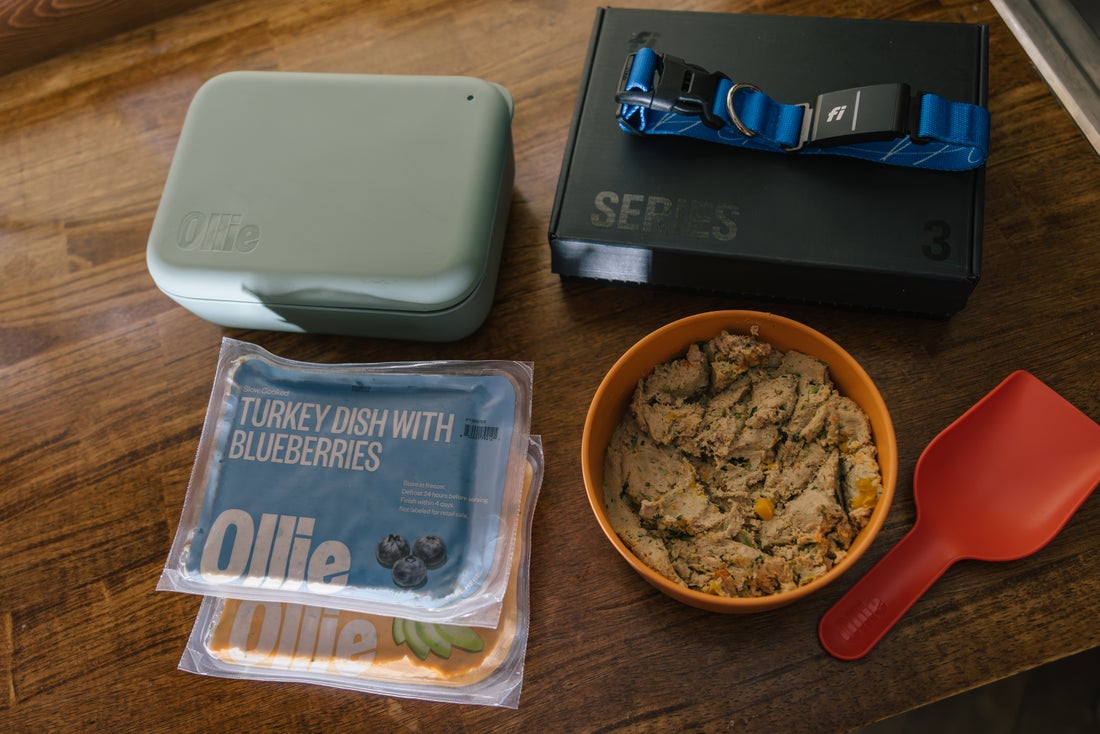Hey Ollie blog readers! We’re offering you an exclusive 60% OFF your starter box! Try now!
Dog ear infections are incredibly common. Most dogs will suffer from an ear infection at some point in their lives—and breeds with long, floppy ears like Cocker Spaniels or Basset Hounds are particularly prone to ear issues. The most common cause of ear infections in dogs is an imbalance of bacteria or yeast in otherwise healthy ears. A holistic approach that takes your dog’s diet and lifestyle into account can help naturally prevent ear infections in the long term.
The Best Natural Remedies for Dog Ear Infections
#1 Clean Your Dog’s Ears Regularly
Cleaning your pup’s ears once a month (or more often if they’re prone to ear problems) greatly reduces the chance of developing an infection. The American Kennel Club recommends first checking inside the ears for debris, scratches, or discharge. Then give your dog’s ears a sniff, since a bread-like odor usually indicates a yeast infection while a foul smelling odor can signify a bacterial infection. Moisten a cotton ball with mineral oil and gently wipe out the ears, going no deeper than the first knuckle on your finger. Avoid using any q-tips, which push bacteria further into the ear canal.
#2 Eliminate Sugars and Grains from Your Dog’s Diet
Approximately 80 percent of dogs with food sensitivities also develop ear inflammation. An excess of grains and sugar in your pup’s diet is one of the most common underlying causes of infection and may be linked to an allergy. A grain-free diet is especially helpful in ear infection prevention since grains contain sugars which yeast feeds on and uses to multiply. In milder cases, simply eliminating grains and sugar can set your pup on the path toward long-term ear health.
#3 Take Special Care After Swimming
Dogs who swim frequently in lakes, oceans or pools are more prone to ear problems. Since both yeast and bacteria (the two major culprits of ear infection) reproduce in moist, dark places, it’s important to take special care to dry your pup’s ears after they head to the beach. Gently pat your dog’s ears using a soft towel, softly squeezing the fur to dry any excess water after swimming. To get water out from inside your dog’s ear, use a cotton pad to gently dab along the opening of the ear canal. If your pup is prone to infections, you should do this after baths, too. Read: “How Often Should I Give My Dog a Bath?”
#4 Topical Treatments to Prevent Dog Ear Infections
Balancing the pH of your pup’s ears is an important step in combating both yeast and bacterial infections. To be proactive about it, a basic ear cleaner can be prepared at home to correct the pH of their ears and kill any contaminants found there: Combine one cup of lukewarm water with two tablespoons of hydrogen peroxide or apple cider vinegar, which can then be used to wipe out excess debris from visible areas of the ear with a cotton ball. Check out these other ways to clean your dog without giving him a bath.
#5 Try Omega-3s and Probiotics for your Dog
Skin and seasonal allergies to pollen, grass, and mites inflame the surface of the body, which can cause infection. The tight space of the ear canal breeds yeast and bacterial growth that can exacerbate ear inflammation. To combat this, add omega-3 fatty acids to your pup’s diet to reduce skin inflammation—they can be found in fish oil supplements and are naturally occurring in foods like salmon and chia seeds.
A suppressed immune system can also make your dog more prone to infection, so it’s important to maintain balance with a probiotic supplement to regulate bacterial flora in your pup’s intestinal tract. Try these other immune-boosting foods for dogs too. Ollie dog food always includes both omega-3 fatty acids and foods to preserve your dog’s immunity, keeping them healthy from ear to paw.
The Ollie blog is devoted to helping pet parents lead healthier lives with their pups. If you want to learn more about our fresh, human-grade food, check out MyOllie.com.
Tagged As:

The nutrition your dog needs,
the food they want.

Enjoying our articles? Subscribe our Newsletters and get new articles directly to your inbox
You might also like
9 October 2025
4 MINS READ
How Fresh Food Can Help Soothe Your Dog’s Allergies
As a pup parent, watching your dog suffer from the constant discomfort of allergies is always distressing. The endless scratching, irritated skin, and digestive upset can take a toll on your pup�…
by Ollie Pets
18 September 2025
4 MINS READ
Is Fresh Dog Food Easier to Digest?
Yes, fresh dog food is generally easier for dogs to digest than highly processed kibble. Because it’s made with whole ingredients, gently cooked, and free from unnecessary fillers, fresh food supp…
by Ollie Pets
18 September 2025
5 MINS READ
Can I Rotate Fresh Dog Food Flavors?
Yes, it’s safe to rotate fresh dog food flavors, and many dogs actually benefit from the variety. At Ollie, we offer multiple fresh recipes, like Beef, Chicken, Turkey, Lamb, and Pork so you can…
by Ollie Pets







